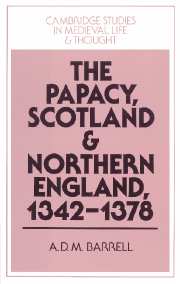Book contents
- Frontmatter
- Contents
- Preface
- Note on currencies
- List of abbreviations
- Map 1 Northern England: dioceses, collegiate churches and major peculiar jurisdictions in the fourteenth century
- Map 2 Northern England, showing some of the more significant places mentioned in the text
- Map 3 Scotland: dioceses and archdeaconries in the fourteenth century
- Map 4 Scotland, showing some of the more significant places mentioned in the text
- Introduction
- 1 Papal taxation and its collection
- 2 Papal provisions
- 3 Opposition to the Papacy
- 4 Judicial aspects of the Papacy
- 5 The Papacy and the bishops
- 6 The Papacy and the regulars
- 7 Papal licences, dispensations and favours
- Conclusion
- Bibliography
- Index
- Titles in the series
2 - Papal provisions
Published online by Cambridge University Press: 05 May 2010
- Frontmatter
- Contents
- Preface
- Note on currencies
- List of abbreviations
- Map 1 Northern England: dioceses, collegiate churches and major peculiar jurisdictions in the fourteenth century
- Map 2 Northern England, showing some of the more significant places mentioned in the text
- Map 3 Scotland: dioceses and archdeaconries in the fourteenth century
- Map 4 Scotland, showing some of the more significant places mentioned in the text
- Introduction
- 1 Papal taxation and its collection
- 2 Papal provisions
- 3 Opposition to the Papacy
- 4 Judicial aspects of the Papacy
- 5 The Papacy and the bishops
- 6 The Papacy and the regulars
- 7 Papal licences, dispensations and favours
- Conclusion
- Bibliography
- Index
- Titles in the series
Summary
The practice of providing clerks to benefices with and without cure was one of the most controversial features of papal relations with Scotland and England. It was, of course, no new phenomenon under the Avignon popes, nor was the controversy which it engendered. In the thirteenth century even Bishop Grosseteste, who had accepted the pope's right to dispose of all benefices, had lamented the unsuitability of some of the clerks who received provision. But the system had been more highly organised by John XXII and codified by Benedict XII, so that by the period here studied papal provisions were numerous, some clerical patrons saw their right to present severely restricted, and the English parliament frequently petitioned the king for redress.
Provisions were of several types. Some were direct grants of a particular benefice at a specific vacancy; others were confirmations of a clerk's position in a benefice he already held where there was reason for doubt about the canonical legality of his institution, or surrogations of an ecclesiastic into the right of another to a disputed benefice. Many, however, were what were termed expectative graces, promising a prebend in a named cathedral or collegiate church when one next fell vacant, or a living in the gift of a particular patron.
- Type
- Chapter
- Information
- The Papacy, Scotland and Northern England, 1342–1378 , pp. 79 - 124Publisher: Cambridge University PressPrint publication year: 1995



